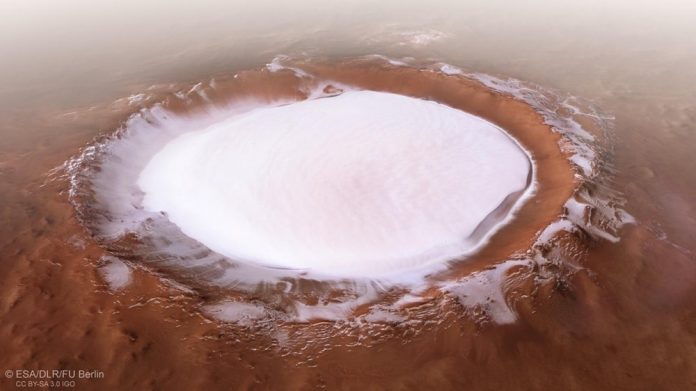Scientists are still unsure if liquid water exists on Mars, but we know there’s plenty of water ice. The ice on Mars is usually diffuse and found in small pockets mixed with frozen carbon dioxide, but the Mars Express probe just beamed back images of a massive deposit of pristine water ice in an impact crater. This isn’t a new discovery, but it’s the best photo we’ve ever gotten of the Korolev crater.
Scientists named Korolev crater after Soviet-era rocket engineer Sergei Korolev, a man so important to the Russian space program that his name was a closely guarded secret. It wasn’t until after his death in 1966 that his importance became publicly known. The Russian government even gave his widow a few specks of moon dust as a thank you for his service.
Mars Express, which is about to celebrate its 15th anniversary orbiting Mars, made several passes over Korolev crater last year. It captured image strips of the crater with its High Resolution Stereo Camera (HRSC), sending the data back to Earth for processing. The newly released images are composites of the strips with a total resolution of 69 feet (21 meters) per pixel.
Korolev crater is near the northern polar region of Mars and measures over 50 miles (81 kilometers) in diameter. The floor of the crater reaches a depth of more than 1.2 miles (2 kilometers) toward the middle. Nothing is known about the object that impacted the planet to create the crater eons ago, but we do know that the high rim of the crater has made it into an ideal “cold trap.”
When the thin Martian atmosphere flows over the rim of Korolev crater, it cools and contracts. This causes a layer of cold air that permanently sits on top of the crater. This chilly envelope of air insulates the crater and keeps it cool all year long. That’s why so much water ice has accumulated inside. Like Earth, Mars has seasons that would otherwise thaw the ice in Korolev crater.
The European Space Agency (ESA) estimates that Korolev crater contains about 528 cubic miles (2,200 cubic kilometers) of water ice. That’s a volume roughly equal to Great Bear Lake in northern Canada. The ice is more than a mile thick in the center of the crater.
It’s a remarkable photo and a good way to celebrate 15 years studying Mars. The Mars Express Probe hits its official 15th anniversary on Christmas Day.








